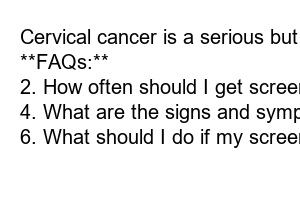자궁경부암 검사 무료대상
**Free Cervical Cancer Screening: Taking Control of Your Health**
Cervical cancer is one of the most common types of cancer among women worldwide. It is estimated that every year, over 500,000 women are diagnosed with cervical cancer, and over 300,000 die from the disease. But here’s the good news – cervical cancer is highly preventable and treatable if caught early. That’s why it’s so important for women to get regular screenings.
**What is Cervical Cancer Screening?**
Cervical cancer screening is a simple and quick test that checks for abnormal cells in the cervix. The most common screening method is the Pap test, which involves scraping cells from the cervix and examining them under a microscope. Another screening method is the HPV test, which looks for the presence of the human papillomavirus, a common cause of cervical cancer.
**Why is Cervical Cancer Screening Important?**
Early detection is key when it comes to treating cervical cancer. By catching abnormal cells in the cervix before they develop into cancer, women can receive timely treatment and improve their chances of survival. Screening also allows healthcare providers to monitor any changes in the cervix over time, providing a more comprehensive view of a woman’s risk for developing cervical cancer.
**Free Cervical Cancer Screening: Where to Go**
Many healthcare providers, clinics, and cancer centers offer free or low-cost cervical cancer screenings to women who are uninsured or underinsured. Additionally, there are often community events and campaigns that provide free screenings to women in need. Check with your local health department or women’s health organizations to find a screening event near you.
**How to Prepare for a Cervical Cancer Screening**
Before your screening, it’s important to avoid douching, using tampons, or having intercourse for at least 24 hours. It’s also a good idea to schedule your screening for a time when you aren’t menstruating, as blood can interfere with the test results. Finally, try to relax – the screening itself only takes a few minutes and is usually painless.
**What to Expect During a Cervical Cancer Screening**
During a Pap test, your healthcare provider will use a speculum to gently open the vagina and collect cells from the cervix. Most women report feeling a slight pressure or discomfort during the test, but it should not be painful. The cells collected will be sent to a lab for analysis, and you will receive the results within a few weeks.
**Take Control of Your Health**
Don’t wait – schedule your free cervical cancer screening today. By taking charge of your health and getting regular screenings, you can reduce your risk of developing cervical cancer and catch any abnormalities early. Remember, early detection saves lives.
**Summary:**
Cervical cancer is a serious but preventable disease that affects thousands of women each year. By getting regular screenings, women can detect abnormal cells early and receive timely treatment. Free screening programs are available for those in need, so don’t hesitate to take advantage of this life-saving opportunity.
**FAQs:**
1. Who should get a cervical cancer screening?
2. How often should I get screened for cervical cancer?
3. What are the risk factors for cervical cancer?
4. What are the signs and symptoms of cervical cancer?
5. Can I still get screened if I am pregnant?
6. What should I do if my screening results come back abnormal?

